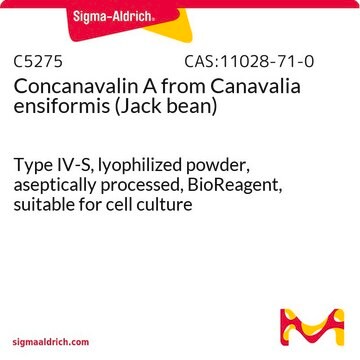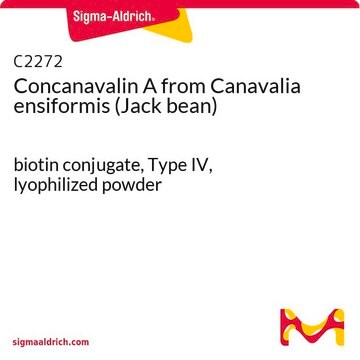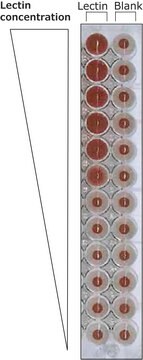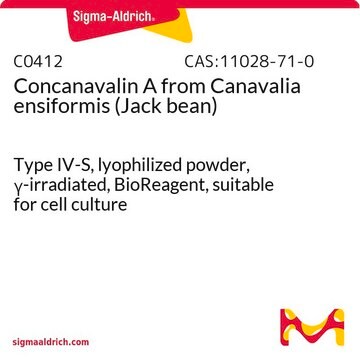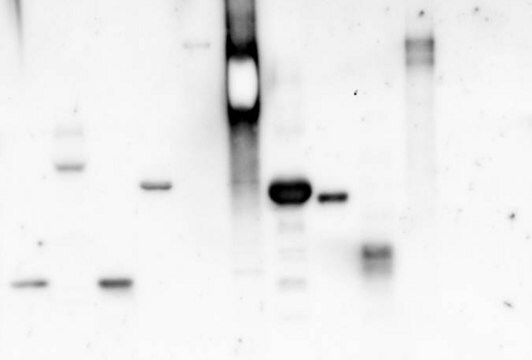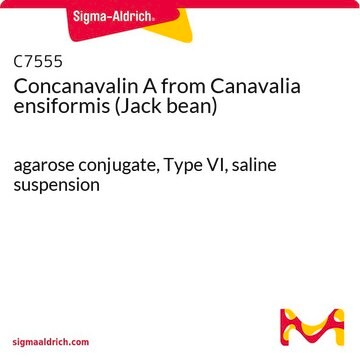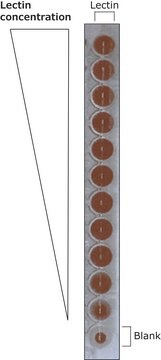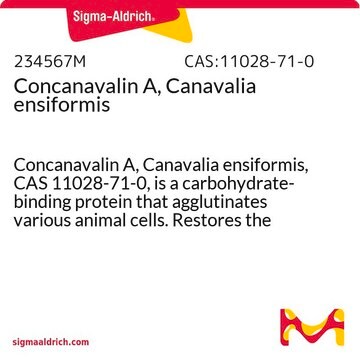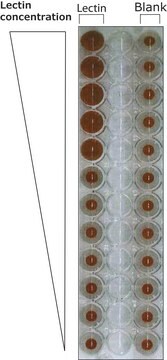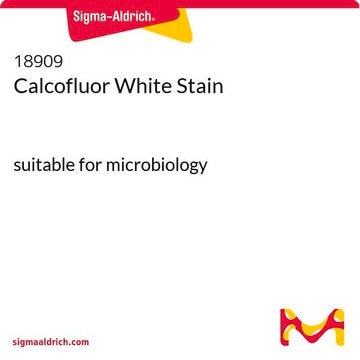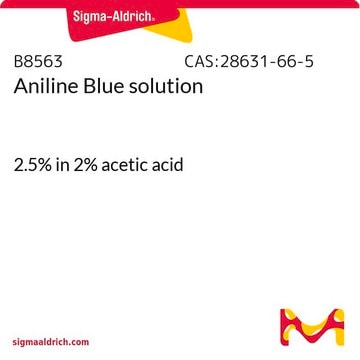C7642
Concanavalin A from Canavalia ensiformis (Jack bean)
FITC conjugate, Type IV, lyophilized powder
Synonym(s):
ConA
Sign Into View Organizational & Contract Pricing
All Photos(1)
About This Item
UNSPSC Code:
12352202
NACRES:
NA.32
Recommended Products
biological source
Canavalia ensiformis
Quality Level
conjugate
FITC conjugate
type
Type IV
form
lyophilized powder
composition
Protein, 5-15% biuret
extent of labeling
3-6 mol FITC per mol protein
impurities
Carbohydrate, essentially free
storage temp.
−20°C
Looking for similar products? Visit Product Comparison Guide
Application
For the fluorescent detection of glycoproteins containing α−D-mannose or α−D-glucose
Biochem/physiol Actions
Con A is not blood group specific but has an affinity for terminal α-D-mannosyl and α-D-glucosyl residues. Ca2+ and Mn2+ ions are required for activity. Con A dissociates into dimers at pH 5.6 or below. Between pH 5.8 and pH 7.0, Con A exists as a tetramer; above pH 7.0 higher aggregates are formed. Con A exhibits mitogenic activity which is dependent on its degree of aggregation. Succinylation results in an active dimeric form which remains a dimer above pH 5.6.
Packaging
Package size based on protein content
Physical form
Lyophilized powder containing phosphate buffer salts and NaCl
Analysis Note
Where reported, agglutination activity is expressed in μg/ml and is determined from serial dilutions in phosphate buffered saline, pH 6.8, containing Ca2+ and Mn2+ of a 1 mg per mL solution. This activity is the lowest concentration to agglutinate a 2% suspension of human erythrocytes after 1 hr incubation at 25 °C.
Signal Word
Warning
Hazard Statements
Precautionary Statements
Hazard Classifications
Skin Sens. 1
Storage Class Code
13 - Non Combustible Solids
WGK
WGK 3
Personal Protective Equipment
dust mask type N95 (US), Eyeshields, Gloves
Certificates of Analysis (COA)
Search for Certificates of Analysis (COA) by entering the products Lot/Batch Number. Lot and Batch Numbers can be found on a product’s label following the words ‘Lot’ or ‘Batch’.
Already Own This Product?
Find documentation for the products that you have recently purchased in the Document Library.
Customers Also Viewed
Nicolas Melin et al.
Cell death & disease, 12(4), 366-366 (2021-04-08)
The toll-like receptor 5 (TLR5) agonist, CBLB502/Entolimod, is a peptide derived from bacterial flagellin and has been shown to protect against radiation-induced tissue damage in animal models. Here we investigated the protective mechanism of CBLB502 in the liver using models
Hyeong Rae Kim et al.
Biosensors & bioelectronics, 170, 112656-112656 (2020-10-04)
Point-of-care risk assessment (PCRA) for airborne viruses requires a system that can enrich low-concentration airborne viruses dispersed in field environments into a small volume of liquid. In this study, airborne virus particles were collected to a degree above the limit
Jianhong Zhou et al.
Biochemical pharmacology, 180, 114108-114108 (2020-06-23)
Noninfectious (autoimmune and immune-mediated) uveitis is an ocular inflammatory disease which can lead to blindness in severe cases. Due to the potential side effects of first-line drugs for clinical uveitis, novel drugs and targets against uveitis are still urgently needed.
Sanda Ljubicic et al.
Biology of the cell, 112(12), 427-438 (2020-08-29)
Cell-cell or cell-substrate interactions are lost when cells are dissociated in culture, or during pathophysiological breakdowns, therefore impairing their structure and polarity, and affecting their function. We show that single rat β-cells, cultured under non-adhesive conditions, form intracytoplasmic vacuoles increasing
Romain Kania et al.
Acta oto-laryngologica, 139(4), 345-350 (2019-02-27)
Biofilms are communities of bacteria embedded in a self-produced glycocalyx matrix. Adenoids have been shown to harbor bacterial biofilms. Aim/objectives: To compare the prevalence of biofilms in adenoid of children with chronic otitis media (COM) (group1) versus a control group
Our team of scientists has experience in all areas of research including Life Science, Material Science, Chemical Synthesis, Chromatography, Analytical and many others.
Contact Technical Service

